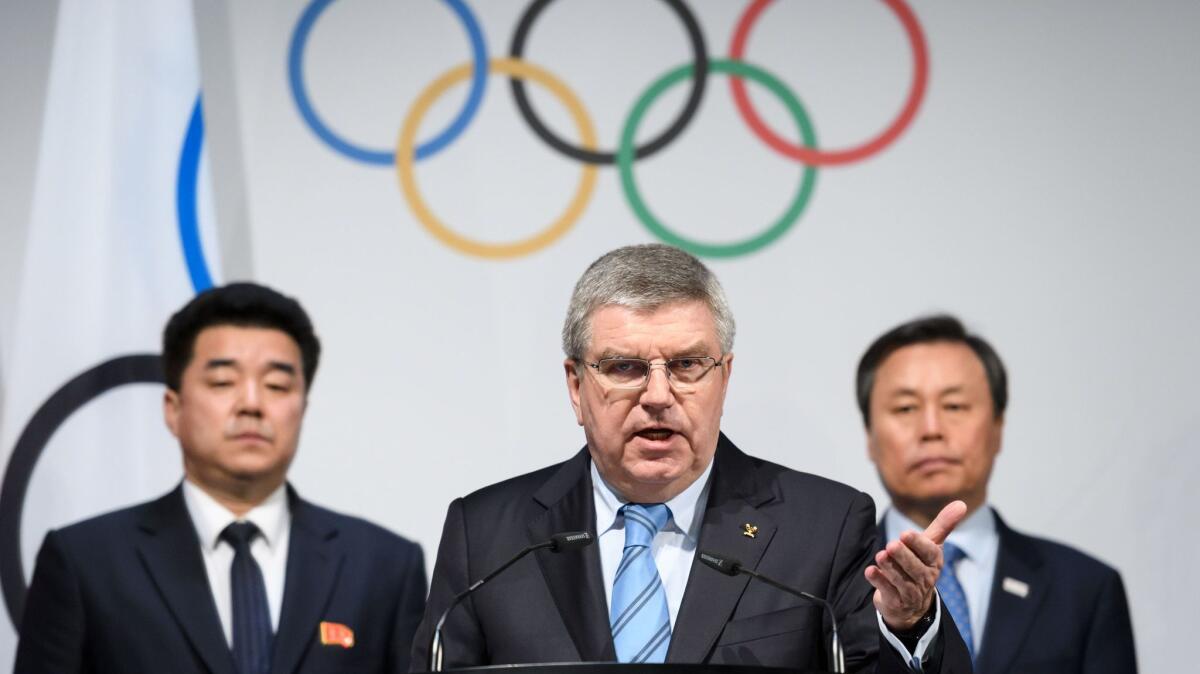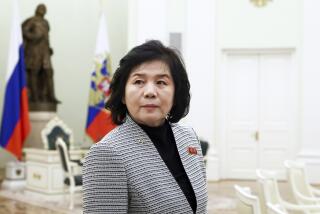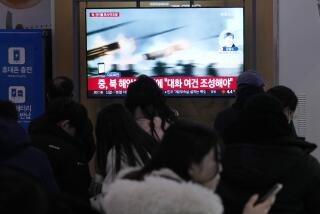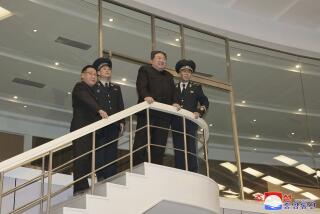North Korea gets official OK to compete in Winter Olympics, will march with South

For all its diplomatic promise, the recent deal securing North Korea’s unexpected participation in the upcoming Winter Olympics still faced one official obstacle: approval from the international event’s governing body.
Both nations cleared it on Saturday.
After meeting with the two nations for several hours, the International Olympic Committee took the “exceptional” step of adding numerous competition slots so the North’s athletes could participate in the Games, which begin Feb. 9.
It also approved a plan for both Koreas — divided under an uneasy truce that halted the Korean War in 1953 — to march together under a unified flag, a milestone in inter-Korean sports relations.
“The Olympic Games are always about building bridges. They never erect walls,” IOC President Thomas Bach said after meeting with delegations from the North and South on Saturday in Lausanne, Switzerland, the committee’s home city.
“The Olympic Winter Games Pyeongchang 2018 are hopefully opening the door to a brighter future on the Korean peninsula and inviting the world to join in a celebration of hope.”
The committee’s decision will allow the North to send 22 athletes to compete in five disciplines across three sports: hockey, skating and alpine skiing. Two dozen coaches and numerous journalists from the North were also invited to join the delegation.
Outside the joint appearance to open the Games, perhaps the most high-profile event will likely be the unified women’s hockey team — the first combined effort in Olympic history for the two nations. It will include 12 players from the North.
The committee’s decision comes nearly two weeks after the two countries first met and agreed in principle to a role for North Korea at the Games, to be based in Pyeongchang, South Korea.
The diplomatic breakthrough resulting in inter-Korea talks — the first high-level dialogue since late 2015 — occurred after the North’s leader, Kim Jong-un, made conciliatory overtures during his annual New Year’s Day speech.
The same speech also contained boastful rhetoric aimed at Washington, a key South Korean ally, about the North’s advancing nuclear weapons and ballistic missile capabilities, an increasing threat to the United States mainland.
Despite the South’s desire for a denuclearized peninsula, its officials quickly offered talks, hoping to use the Olympics as a catalyst for peace and perhaps reduce tensions on the peninsula. The relationship has grown worse in the last year after a series of internationally condemned provocations by the North, including an underground nuclear test and the test launch of three intercontinental ballistic missiles.
The agreement to walk together at the opening ceremony under a unification flag and to field an inter-Korean hockey team was an unexpected development this close to the Games.
“Let us not forget that such an agreement would have seemed impossible only a few weeks ago,” Bach said during his announcement.
Over the years, the two nations — which share a common language and culture spanning hundreds of years — have endured periods of tension and occasional cooperation. The relationship has turned sour in the last decade, especially as the North’s pursuit of nuclear weapons began to show real signs of progress.
In addition to competing with the South, the North also negotiated the ability to bring a 140-person orchestra and a 230-person cheering squad — part of a broader charm offensive that outside analysts say appears aimed at highlighting the isolated nation’s arts and culture programs.
The North also plans to send a taekwondo demonstration team and to participate in shared cultural events with the South. Many of the details and planning for specific dates and venues were still being negotiated.
The deal has been controversial among some segments of the South Korean population, which remain distrustful of the North’s motives and worried that its own Olympic hockey athletes might see a reduced role under a unified team.
The cooperation effort — which has fallen apart during previous effort to work together during past international sporting events — took a worrying turn on Saturday when the North failed to send a team from its music troupe to plan for its performances in the South. They are expected next month in Seoul and Gangneung, another city playing host to Olympics events.
That effort appeared to be back on track, with a new schedule in place, an official from the South’s presidential office said in a statement Saturday night.
In addition to the hockey squad, the Olympic committee also approved an additional space for a figure skating pair — Ryom Tae Ok and Kim Ju Sik — that initially qualified but missed a registration deadline.
Two male athletes from the North — Jong Kwang Bom and Choe Un Song — were granted permission to compete in short-track speed skating.
Three athletes will be allowed to race in cross-country skiing: two men, Han Chun Gyong and Pak Il Chol, and one female athlete, Ri Yong Gum.
And another three athletes will participate in alpine skiing: two men, Choe Myong Gwang and Kang Song Il, and one women, Kim Ryon Hyang.
The athletes weren’t expected to be favorites to win medals, and the committee also restricted the size of the hockey squad during games out of fairness to other countries.
Bach, the committee president who recalled his own life growing up in a once-divided Germany, said the opening ceremony display and the hockey team’s joint competition would reflect the spirit of the Games.
“I’m sure that this will be a very emotional moment, not only for Koreans, but also the entire world,” said Bach, a one-time Olympic fencer. “This team will be a great symbol of the unifying power of Olympic sport.”
Stiles is a special correspondent.
UPDATES:
5:15 a.m.: Updated with Times reporting.
This article was first published at 4:40 a.m.
More to Read
Start your day right
Sign up for Essential California for news, features and recommendations from the L.A. Times and beyond in your inbox six days a week.
You may occasionally receive promotional content from the Los Angeles Times.







